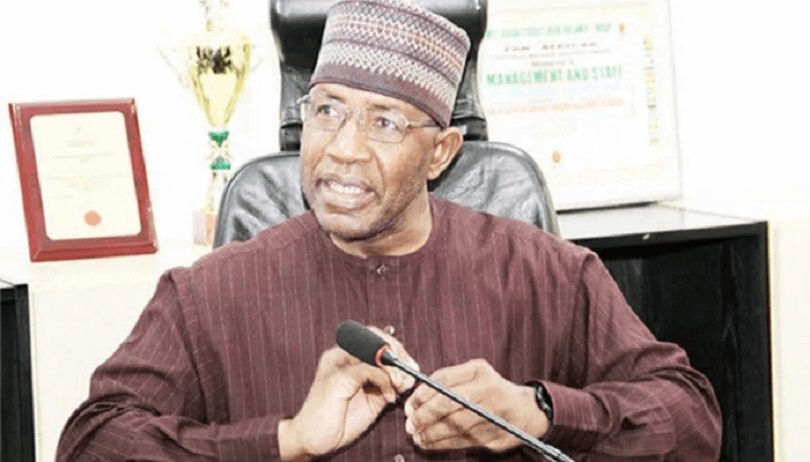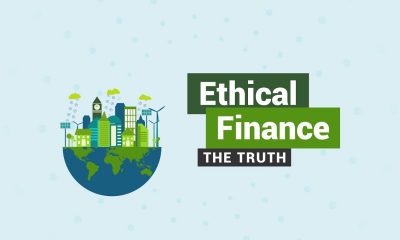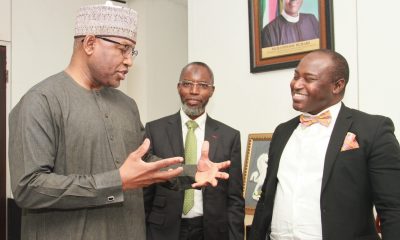Economy
SEC Plans to Boost Value of Shariah-Compliant Products to N5trn by 2025

By Aduragbemi Omiyale
The Securities and Exchange Commission (SEC) has said it plans to expand the size of the Shariah-compliant products in the non-interest capital market in Nigeria to at least N5 trillion by 2025.
The Director-General of SEC, Mr Lamido Yuguda, said the revised edition of the Capital Market Master Plan (2021 – 2025), which was launched recently, has mapped out ways to achieve this goal.
Speaking at the opening of a three-day capacity-building workshop for local Shariah talent for non-interest capital market held at the SEC head office in Abuja on Wednesday, Mr Yuguda said this could be achieved through the listing of at least 50 Shariah-compliant products.
The DG, who was represented by the SEC’s Executive Commissioner Operations, Mr Dayo Obisan, said that the Non-Interest Capital Market (NICM) also plans to ensure 100 retail Shariah-compliant products and attract about 1 million direct investors in the ecosystem.
Mr Yuguda noted that with these new responsibilities, promoting capacity-building programmes, such as the workshop, on Shariah-compliant processes and products (Regulators and Operators) has become necessary for the NCIM.
He said the commission, in recognising the potential of the non-interest capital market for economic growth, dedicated a component in its 10-year policy to the speedy development of the market in the financial system.
Specifically, Mr Yuguda said the plan provides clear strategic objectives for the development of the market, one of which is the “encouragement of the development of stakeholders for the market” and today’s workshop is evidence of the realization of this particular objective.
The stride and significant achievements recorded by the policy, he said, are evidenced by the last ranking of Nigerian Islamic Finance in 13th place on the global Islamic Finance Development Indicator 2021, with the assets under management valued at N2.30 billion, which is higher than countries like Bangladesh and Turkey.
“As you may be aware, the major difference between conventional finance and non-interest finance is the application of Shariah principles. This simply means that a non-interest financial market cannot exist without experts in Islamic commercial jurisprudence (FiqhulMu’amalat Al-Maliyya).
“Therefore, this Workshop will help in fast-tracking the development of experts for the Market. We believe that it would be a magic lamp for developing our local Sharia talent, not only for the Nigerian capital market but for the Nigerian financial system in general.
“The level of activities in the non-interest capital market that we are currently experiencing in Nigeria affirms the overwhelming acceptance of NICM products by the country’s populace. This shows a strong appetite for other alternative forms of investments.
“Recently, the market witnessed the entrance of institutions offering non-interest capital market services/products and the oversubscription of the FGN and corporate Sukuk, further buttresses the need for this workshop to encourage the development of Shariah experts for the market.”
The DG said the workshop is aimed at exposing participants who have the potential to provide Shariah advisory services for the Islamic finance industry, particularly the non-interest capital market’s operations as it relates to Shariah principles and rulings. It is also planned to be in two levels, Level 1 and 2.
He stated that Level 1, is focused on the basic areas of financial market structure and operations of the capital market, Shariah principles and contracts relating to non-interest capital markets, as well as Shariah issues relating to the operations and businesses of the market, among others while level-2 which will address the operation of the Sukuk and equity markets.
The SEC boss said NICM has so much potential in the country by attracting an untapped investor base who appears indifferent to conventional instruments to participate in the capital market as well as the existing investors to diversify to ethical and socially responsible investments.
“We believe that developing Shariah talent through a Workshop like this is another opportunity of creating awareness for the non-interest capital market products and services, which in turn will facilitate the financial inclusion drive in the Nigerian Financial System.
“I am happy to note that the commission recently exposed registration rules to set a minimum standard for corporate or individuals seeking to provide Shariah advisory services for non-interest capital market activities. This is to encourage further and attract the attention of qualified persons and entities to engage in the Shariah advisory function for the non-interest capital market.”
Mr Yuguda expressed the confidence that the participants will benefit from the vast knowledge and experience of the facilitators, which will bring about a much-needed impact on the participants and the market in general.
Economy
CBN Reduces Interest Rate by 50 Basis Points to 26.50%

By Adedapo Adesanya
The Central Bank of Nigeria (CBN) has cut the interest rate by 50 basis points to 26.50 per cent from 27 per cent.
Nigeria’s apex bank announced this during its two-day 304th Monetary Policy Committee (MPC) meeting, which concluded on Tuesday in Abuja.
This comes after the country’s interest rate cooled in January to 15.10 per cent from 15.15 per cent, according to the National Bureau of Statistics (NBS), strengthening the case for a reduction.
The CBN Governor, Mr Yemi Cardoso, said all members of the MPC unanimously agreed upon the decision.
“The committee decided to reduce the monetary policy rate by 50 basis points to 26.50 per cent,” he said.
Mr Cardoso stated that the liquidity ratio was maintained at 30 per cent, and the standing facilities corridor was adjusted to +50 to -450 basis points around the monetary policy rate.
He said the committee retained the Cash Reserve Ratio (CRR) at 45 per cent for commercial banks and 16 per cent for merchant banks, while the 75 per cent CRR on non-TSA public sector deposits was equally maintained.
The CBN uses the MPR, which works as the benchmark interest rate, to manage inflation, macroeconomic stability, and liquidity.
Last November, the MPC retained the Monetary Policy Rate (MPR) at 27.00 per cent. The last time the apex bank cut interest rates was in September last year, to 27 per cent from 27.50 per cent after a series of easing in inflation.
Market analysts had argued for higher interest cuts due to results seen in the CBN’s inflation targeting framework. Meanwhile, some say the 50 basis points reduction will offer a temporary reprieve as inflation heads for a single-digit target in the coming months.
Economy
Grey to Cut Cross-Border Payment Costs with New USD Offering

By Adedapo Adesanya
A cross-border payments solutions company, Grey has expanded its business banking platform to include US Dollar corporate accounts, bulk international payments, and USDC stablecoin support, all integrated into a single system.
The company is positioning itself as a low-cost, faster alternative to traditional international banking, particularly for businesses in emerging markets as it enables companies to open US Dollar accounts, receive global payments, and send payouts to 170+ countries, including bulk transfers, within minutes.
Grey aims to solve common cross-border payment challenges, particularly the high transfer costs that often range between 6 and 7 per cent of transaction value, prolonged settlement cycles that can stretch across several days, and the limited access many businesses face when trying to open and operate foreign currency accounts. In addition, companies frequently contend with hidden intermediary fees and poor foreign exchange transparency, both of which undermine cost predictability and effective cash flow management.
By integrating USD business accounts and USDC stablecoin functionality into its platform, Grey enhances its value proposition around faster settlement, clearer pricing structures, improved cost efficiency, and broader global accessibility. The expanded capabilities enable businesses to manage international transactions with greater speed, transparency, and operational control.
“Businesses may operate without borders today, but access to reliable global banking remains uneven, particularly for companies in high-growth markets,” said Mr Idorenyin Obong, Co-founder and Chief Executive Officer of Grey. “We’re closing that gap and enabling businesses to move money faster, with greater transparency and control, wherever their clients or partners are based.”
“When payments are delayed, or costs are unpredictable, growth stalls,” added Mr Joseph Femi Aghedo, Chief Operating Officer and Co-founder of Grey. “Grey eliminates those friction points, giving businesses a faster, simpler way to manage payroll, supplier payments, and partner payouts across borders. Adding USD and stablecoin capabilities makes these benefits accessible to even more customers.”
Established in Africa in 2020, Grey has a presence in key markets, including the United States, the United Kingdom, and Europe, and has recently expanded its services and operations into Latin America and Southeast Asia.
Since its inception, the company has consistently enhanced its services to empower digital nomads worldwide, regardless of location. Grey’s offerings include multi-currency accounts, low-cost international money transfers, a virtual USD card, expense management tools, and robust security measures.
Economy
Quidax, Lisk to Unlock Stablecoins, On-chain Financial Opportunities

By Aduragbemi Omiyale
A partnership designed to expand access to stablecoins and on-chain financial opportunities for everyday users and businesses has been entered into between Quidax and Lisk.
The partnership provides a critical gateway for the developer community, as builders on the Lisk network can now leverage Quidax’s robust digital asset infrastructure to access stablecoins and local currencies at competitive rates.
This institutional-grade infrastructure is designed to power “future-forward” financial products, ranging from neobanks and cross-border payment platforms to regional exchanges and global fintech solutions. It will also allow Quidax customers to trade and move value seamlessly using USDT, USDC, LSK, and Ether (ETH) on the Lisk network.
The collaboration will also accelerate the adoption of Web3 solutions that solve real-world financial challenges for millions of customers across Africa by combining Quidax’s deep local liquidity and compliant framework with Lisk’s scalable L2 technology.
In 2024, Quidax became the first crypto exchange to receive a provisional operating license from Nigeria’s Securities and Exchange Commission (SEC).
“The partnership with Lisk enables us to extend our platform to serve more people and cater to the increasing demand from products and services that want to integrate our stablecoin and digital assets product to build products across Africa,” the Chief Infrastructure Officer at Quidax, Mr Morris Ebieroma, said.
Also commenting, the Ecosystem Lead for Africa at Lisk, Ms Chidubem Emelumadu, said, “Africa represents one of the most critical frontiers for blockchain innovation, where the demand for reliable and inclusive financial tools is urgent.
“Our partnership with Quidax expands access to stablecoins and on-chain financial opportunities for everyday users and businesses. At the same time, it gives founders building on Lisk the critical infrastructure they need to create solutions that can scale meaningfully across the continent,” she added.
-

 Feature/OPED6 years ago
Feature/OPED6 years agoDavos was Different this year
-
Travel/Tourism10 years ago
Lagos Seals Western Lodge Hotel In Ikorodu
-

 Showbiz3 years ago
Showbiz3 years agoEstranged Lover Releases Videos of Empress Njamah Bathing
-

 Banking8 years ago
Banking8 years agoSort Codes of GTBank Branches in Nigeria
-

 Economy3 years ago
Economy3 years agoSubsidy Removal: CNG at N130 Per Litre Cheaper Than Petrol—IPMAN
-

 Banking3 years ago
Banking3 years agoSort Codes of UBA Branches in Nigeria
-

 Banking3 years ago
Banking3 years agoFirst Bank Announces Planned Downtime
-

 Sports3 years ago
Sports3 years agoHighest Paid Nigerian Footballer – How Much Do Nigerian Footballers Earn



















